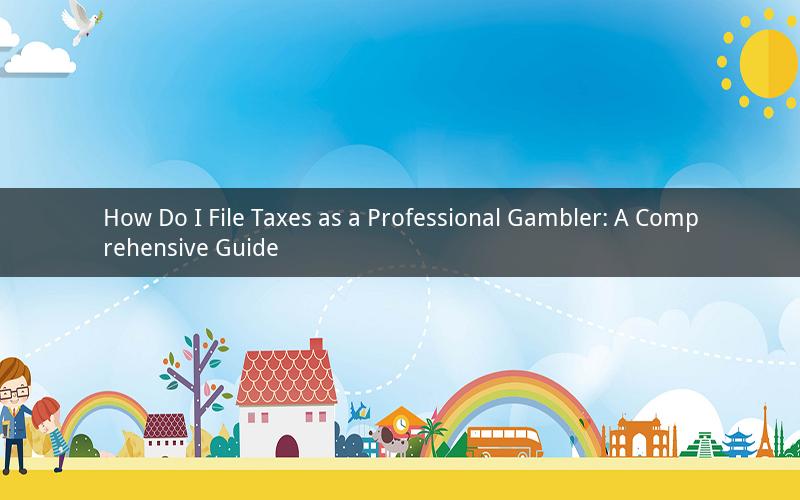
Introduction
As a professional gambler, managing your taxes can be a complex and challenging task. Unlike regular employment, your income may fluctuate significantly, and you may have various sources of earnings. Understanding how to file taxes effectively is crucial to ensure compliance with tax laws and maximize your financial benefits. In this article, we will explore the steps and considerations for filing taxes as a professional gambler.
1. Establishing Tax Status
Before filing your taxes, it is essential to establish your tax status as a professional gambler. The IRS recognizes professional gamblers as self-employed individuals. This means you will file Schedule C (Form 1040) to report your gambling income and expenses.
2. Reporting Gambling Income
Gambling income includes any winnings from casino games, sports betting, poker, and other gambling activities. Unlike casual gamblers, who can deduct their losses up to the amount of their winnings, professional gamblers can deduct their business expenses.
To report your gambling income, you will need to maintain accurate records of all your winnings. This can be done by keeping receipts, canceled checks, or bank statements. If you win a large sum, you may receive a Form W-2G, which reports the amount of your winnings to the IRS.
3. Deducting Business Expenses
Professional gamblers can deduct various business expenses to offset their gambling income. Some common deductible expenses include:
a. Travel expenses: Costs associated with attending gambling events, such as transportation, accommodation, and meals.
b. Entertainment expenses: Expenses related to entertaining clients or potential clients, such as meals, tickets to events, and other recreational activities.
c. Gambling equipment: Expenses for purchasing or repairing gambling equipment, such as poker tables or sports betting software.
d. Legal and professional fees: Costs incurred for legal and tax advice, as well as other professional services.
e. Insurance: Premiums paid for insurance coverage related to your gambling business.
When deducting these expenses, it is important to keep detailed records and receipts. Only expenses that are directly related to your gambling business and are ordinary and necessary can be deducted.
4. Home Office Deduction
If you use a specific area of your home exclusively for your gambling business, you may be eligible for a home office deduction. To qualify, the space must be used regularly and exclusively for conducting your gambling business.
The home office deduction allows you to deduct a portion of your rent, mortgage interest, property taxes, insurance, and utilities based on the percentage of your home used for business purposes.
5. Self-Employment Tax
As a self-employed professional gambler, you are responsible for paying both the employer and employee portions of self-employment tax. This tax covers Social Security and Medicare taxes and is calculated based on your net earnings from self-employment.
To calculate your self-employment tax, you will need to complete Schedule SE (Form 1040) and include it with your tax return.
6. Filing Requirements
Professional gamblers must file a tax return by April 15th, unless they qualify for an extension. To file your taxes, you can choose to do it yourself using tax preparation software or hire a tax professional.
It is important to double-check your tax return for accuracy and ensure that all required forms and schedules are attached. If you need to make estimated tax payments throughout the year, you must do so by the deadlines to avoid penalties and interest.
7. Additional Considerations
Here are some additional factors to consider when filing taxes as a professional gambler:
a. Reporting Foreign Income: If you have gambling income from foreign sources, you must report it on Form 1040 and may be subject to foreign tax credits.
b. Amending Previous Returns: If you discover that you underreported your gambling income or claimed incorrect deductions, you may need to file an amended tax return.
c. Keeping Records: Maintain detailed records of all your gambling income and expenses for at least seven years in case of an IRS audit.
d. Hiring a Tax Professional: Consider hiring a tax professional who has experience with professional gamblers to ensure compliance with tax laws and maximize your deductions.
Conclusion
Filing taxes as a professional gambler requires careful planning and attention to detail. By establishing your tax status, accurately reporting your income, deducting allowable expenses, and adhering to filing requirements, you can ensure compliance with tax laws and optimize your financial situation. Remember to consult with a tax professional for personalized advice and assistance.
5 Related Questions and Answers
1. Question: Can I deduct my personal gambling losses as a professional gambler?
Answer: No, as a professional gambler, you can only deduct business expenses directly related to your gambling activities, not personal losses.
2. Question: What if I win a large jackpot and receive a Form W-2G?
Answer: When you receive a Form W-2G, you must report the amount of your winnings on your tax return. Keep the form for your records and consult with a tax professional if you have any questions.
3. Question: Can I deduct travel expenses for attending a gambling convention?
Answer: Yes, you can deduct travel expenses for attending a gambling convention if they are directly related to your gambling business and meet the criteria for a business expense.
4. Question: Do I need to file an amended tax return if I discover an error on my original return?
Answer: Yes, if you discover an error on your original tax return, you must file an amended return to correct the mistake. Keep in mind that you must file the amended return within three years from the original filing date or two years from the date you paid the tax, whichever is later.
5. Question: Can I deduct the cost of purchasing a new computer for my gambling business?
Answer: Yes, if the computer is used exclusively for your gambling business, you can deduct the cost of purchasing it as a business expense. Be sure to maintain detailed records and receipts for the purchase.